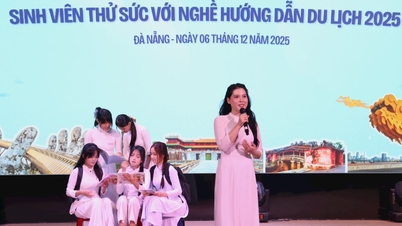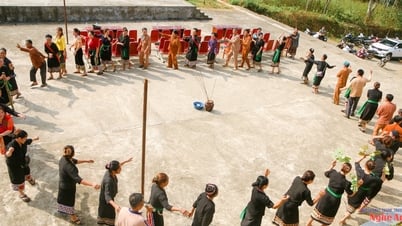 |
| Parents bring new students to school to complete enrollment procedures. (Illustrative image) |
For many years, History has often been associated with the stereotype of being dry and focused on memorizing facts and figures, leading many students to consider it a secondary subject. This situation has raised concerns about the risk of the younger generation turning their backs on national history.
However, in recent years there has been a significant shift. The education program has been reformed to promote critical thinking, and teaching approaches have become increasingly dynamic. Many young teachers are boldly applying storytelling methods, utilizing documents, films, and digital technology, transforming dry historical texts into relatable lessons connected to real life. Along with this, society is paying more attention to "preserving the national spirit," affirming that history is not just a subject, but also a foundation of culture.
The high entrance exam scores for History Education not only demonstrate the field's appeal but also reflect societal demand. Making History a compulsory subject in the new general education curriculum is a significant boost, opening up stable career opportunities for students. Simultaneously, the development of research, media, museums, and cultural tourism also creates more job opportunities for those studying History.
This year's candidates' choice of History shows that the younger generation is drawn to the field not simply for the "easy job opportunities" or "high income," but from a deep understanding of the role of historical knowledge in the country's development. This is a welcome sign, reflecting the love and responsibility of young people towards the community and the national memory.
Therefore, we can expect that this shift in approach will contribute to overcoming the shortage of history teachers in many localities, a problem that has been a concern for the education sector in recent times.
Of course, high admission scores alone are not enough to guarantee the quality of training or ensure wide-ranging career opportunities. The important issue is how to transform this "wave of enthusiasm" into a real driving force to improve the quality of teaching and learning History.
To achieve this, teacher training colleges need to continue innovating training methods, strengthening practical application, linking learning with cultural spaces and historical sites; and at the same time, inspire passion and research skills in students.
Beyond the story of grades, the rise of History Education reflects a shift in societal perception of the role of social sciences and humanities, with History at its center. When the past is recognized for its true value, the present will have a solid foundation to build the future.
Source: https://baothainguyen.vn/giao-duc/202508/lich-su-len-ngoi-66a5c8c/

































































![[Image] Ho Chi Minh City simultaneously commences construction and breaks ground on 4 key projects.](https://vphoto.vietnam.vn/thumb/1200x675/vietnam/resource/IMAGE/2026/01/15/1768472922847_image.jpeg)











































Comment (0)